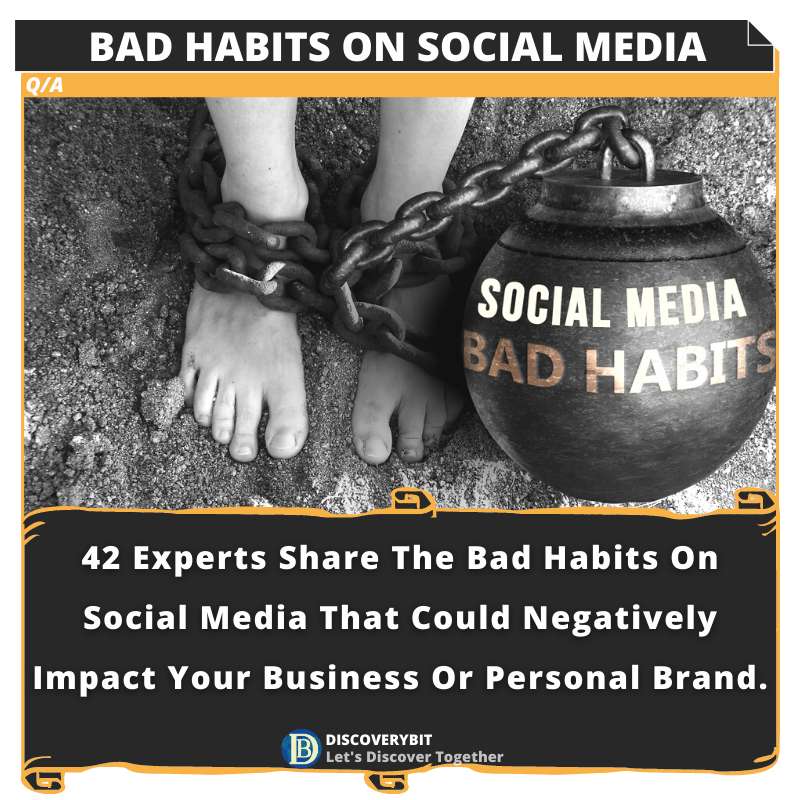Being Overly Promotional On Social Media
1) Tomas Keenan
 Posting information about a product or service on social media is a great way to reach potential customers. However, Overly promotional posts can be implied, by social media users, as being too pushy and spammy.
Posting information about a product or service on social media is a great way to reach potential customers. However, Overly promotional posts can be implied, by social media users, as being too pushy and spammy.
Use The Freebies/ Promos In Our Store
An overpromotion of products and services by a brand or a business can alienate potential customers who might otherwise be interested in what you have to offer. And so, it is essential to balance selling and engaging with your audience, as you can’t constantly bombard your audience with offers for your latest products or services.
One of the ways I have found to be very successful in keeping this balance is to leverage the 80/20 rule. For every four contents that you post, write three to educate or engage your audience, and write a post to promote your business.
Social media, if done correctly, builds knowledge, like, and trust with potential customers. And as a result, you’ll more likely win over customers and build long-lasting relationships.
You can still rectify any damage done to your audience by simply following the 80/20 rule TODAY! Moreover, you can always go back and delete overly promotional posts that have little to no engagement.
Indulging In Chain Letters And Reposts
2) Tony Staehelin
 Social media platforms are a great way to connect with people and the community. But the moment I start getting chain letters or reposts from someone or business, I feel a huge disconnect from that person or brand.
Social media platforms are a great way to connect with people and the community. But the moment I start getting chain letters or reposts from someone or business, I feel a huge disconnect from that person or brand.
chain letter, by the way, is a letter sent to several persons with a request that each send copies of the letter to a certain number of recipients.
Chain letters are not personal, they’re not about connecting and developing relationships, and they add social pressure to act on something that one has little to no information on.
Reposts are simply a method for someone to get more clicks. Their purpose is to drive traffic, which immediately makes me realize that this is not about connecting; but is purely for personal gain.
I, then, lose my relationship with anyone who sends chain letters or reposts on my feed/page; because the human relationship has been taken off the list.
Posting Poor Quality Content
3) Ilija Sekulov
 It is almost obvious… and yet, we still see poor quality content on social media platforms. This will quickly change in the next few years.
It is almost obvious… and yet, we still see poor quality content on social media platforms. This will quickly change in the next few years.
There was a time when social networks pushed all types of content–good or not so good– so that users can spend more time on the platforms.
Today, users are more selective; they no longer want to waste time reading a poor-quality article or watching a video that says the same thing, like many others.
There is, in 2022, simply too much content being published on social media platforms, and efforts are being made by the social platforms to ensure that only the best content becomes more visible.
Good content, what is it?
It is content that inspires, educates, or entertains; such content collects reactions, comments, and shares.
And bad content, what does it look like?
It is content that does not provide value and/or is not relevant to the target audience. In other words, it’s content that your audiences do not bother to like, comment on or share.
Luckily, you can easily identify quality content that you’ve already posted on your accounts to use as a reference for posting new but similar content.
4) Evelyn Ott
 There are a lot of unreal/poor quality content on social media platforms. Many people, especially couples, on these platforms fake their pranks, and their videos can be exhausting.
There are a lot of unreal/poor quality content on social media platforms. Many people, especially couples, on these platforms fake their pranks, and their videos can be exhausting.
Couples would post videos of the pranks that they played on their spouse like they were real, but it is obvious that the prank was planned and acted out.
I, like many others, don’t like seeing these. These people just want to gain viewers and have their videos go viral by acting out the fakest pranks you’ll ever see. Some will try to make them look real, but many are clearly very fake.
People get very annoyed by this. And for that reason would write many hateful and hurtful comments on the fake video posts.
Moreover, these posters would lose their followers as people would no longer trust their content, anymore, once they notice that even one of their videos is fake.
The only way to fix the loss of trust is to be honest with your followers. And probably expose every other fake out there.
Tagging Too Many People In A Post
5) Stephen Heffernan
 We all know that person who likes to tag 20 friends when s/he posts, or shares a status update that includes even more.
We all know that person who likes to tag 20 friends when s/he posts, or shares a status update that includes even more.
Tagging people in posts can be a great way to share content with your friends. But if you tag too many, it can come across as spammy, and there are a lot of people who won’t appreciate that.
Tagging Random Accounts On Social Media
6) Nathan Watson
 Most of us social media users have come across a situation where a random stranger would tag you in a completely unrelated random post.
Most of us social media users have come across a situation where a random stranger would tag you in a completely unrelated random post.
That doesn’t make sense, right?
Even as a professional social media business account manager, I have seen many newcomers to my sector tag random accounts on their business posts in hopes that they will attract people/customers. Mind you, it won’t.
Inappropriate tagging is quite an annoying habit that some people have on social media. It is a myth that irrelevant tags will attract potential customers.
You only need to tag those who are somehow related to the post content. It can be someone present in the photo or if it is a graphic, you can tag the graphic designer.
Not Being Social On Social Media
7) Staci Brinkman
 The point of social media is to connect with people. It is a big no-no, for me, when someone or a business just posts automatically every day, at the same time, and also doesn’t engage with their audience.
The point of social media is to connect with people. It is a big no-no, for me, when someone or a business just posts automatically every day, at the same time, and also doesn’t engage with their audience.
First, posting automatically at the same time every day, using post planners, makes me wonder who’s really behind that post. Two, it shows me that this is purely self-interest driven and that you have no desire in creating community when you ignore your audience and don’t engage with them.
You have to bring in the human element and connect with your community regardless of whether you’re trying to build a business or personal brand.
Buying Social Media Followers
8) George Pitchkhadze
 One of the worst social media habits that come to mind, for me, is creating an *inorganic* following on Instagram–AKA purchasing followers and “likes.”
One of the worst social media habits that come to mind, for me, is creating an *inorganic* following on Instagram–AKA purchasing followers and “likes.”
This is not only dishonest but will completely screw up your algorithm. As the “followers” that you buy are most likely bots, which means that their accounts are not active.
This is bad news for you because you will not receive the engagement needed to have your account shown in other people’s feeds. You will also receive “spam” comments on your posts, which your *real* followers will see and be turned off by.
There’s a strong possibility of it ruining your reputation too, as your social media account would appear fake, which is also a turn-off and people will no longer trust your brand.
I think it is always best to naturally grow your social media, even if it takes more time. You can create real relationships with your targeted audience this way.
Oversharing On Social Media
9) Aimee White
 One of the worst bad habits someone can have on social media is oversharing, which is something that many people do, yet they may not even realize they are doing this. While it can be tempting to share our thoughts and opinions on social media, this is not always helpful as it can harm one’s personal, work, or business lives.
One of the worst bad habits someone can have on social media is oversharing, which is something that many people do, yet they may not even realize they are doing this. While it can be tempting to share our thoughts and opinions on social media, this is not always helpful as it can harm one’s personal, work, or business lives.
It’s so important to be careful when sharing things on social media. Sharing information that’s too personal can make people uncomfortable, and probably worst for you when you share sensitive information that is not appropriate for social media.
Oversharing on social media is easy to do as there are rarely repercussions. However, oversharing can impact you when it comes to work-life. For example, sharing things about your workplace, or things that are too personal could annoy your employer or anyone else involved.
And this is especially true if you have your workplace negatively mentioned on your profile, as your thoughts and opinions can potentially be linked to your employer.
Oversharing can cause damage to you too, as it could potentially lead to things that you’ve said being taken out of context. In addition to this, it could cause you to be cyberbullied.
10) Anna Lan
 We no longer filter what we share because we want to trend on social media.
We no longer filter what we share because we want to trend on social media.
Oversharing can irritate your followers, making them decide to unfollow you. Also, it makes it easy for us to be targeted by dangerous people when we tag every location that we go to.
However, to prevent this from happening, avoid using geotags and do not post on the spot. You should upload your pictures as a carousel, where you add multiple photos in one upload so that you will not be seen frequently on other people’s news feeds.
11) Fred Hoffman
 Oversharing can include posting too many photos of yourself; constantly sharing your political or religious views, or endlessly complaining about your daily activities.
Oversharing can include posting too many photos of yourself; constantly sharing your political or religious views, or endlessly complaining about your daily activities.
Oversharing can hurt your reputation on social media platforms.
You can avoid being disliked on social media by limiting what you share to only the most relevant or interesting content, and taking the time to consider whether each post will add value to other users. In addition, you should pay attention to how your posts are received by others.
Poor Grammar And Writing
12) Kevin Daly
 One of the most common bad habits that I see on social media platforms is the lack of capitalization and poor use of the English language. These have implications as they make it difficult to read your content, and could be confusing.
One of the most common bad habits that I see on social media platforms is the lack of capitalization and poor use of the English language. These have implications as they make it difficult to read your content, and could be confusing.
If, for example, you’re going to use all lowercase letters, you need to be consistent throughout your post or else your audience will be left wondering whether they should be capitalizing words or not.
And it’s also important to note that people don’t like reading all lowercase letters because it looks sloppy and amateurish. And poor grammar makes you seem unprofessional.
So how do you fix this? At the very least, learn how to capitalize properly when writing on social media platforms like Facebook and Twitter, so that your posts are easier for others to read! You can also use the free version of Grammarly to draft your content before posting. It should be enough to help you output a decent grammatically correct post.
The Constant Use Of Emojis
13) David Rowland
 Emojis may be a great way to express yourself, but it’s very annoying when people use them in every sentence or paragraph.
Emojis may be a great way to express yourself, but it’s very annoying when people use them in every sentence or paragraph.
The constant use of emojis could imply that you’re trying too hard to be funny or interesting, and it could even make you seem like a child who isn’t mature enough to express themselves without using emojis.
So try to keep your usage of emojis to a minimum to avoid being misunderstood.
Poor Authentication Of Information And Source (Fake News)
14) Ronald Williams
 There is one bad habit on social media that I particularly dislike. And that is when people forward whatsoever is on their social media feed to their followers without authenticating the information.
There is one bad habit on social media that I particularly dislike. And that is when people forward whatsoever is on their social media feed to their followers without authenticating the information.
They don’t bother to confirm the source or its credibility and become part of a “fake viral” trend that unconsciously affects many psychologically. For example, amid the covid-19 pandemic, many people suffered mental trauma from the fake numbers of casualties that went viral on social media.
Therefore, as a remedial measure, I would suggest being careful when posting on social media and doing a “fact check” before you post or forward anything.
Inconsistency In Posting Or Shotgun Posting
15) Granger McCollough
 One bad habit that everyone with a social media platform, whether it’s for business or personal need, has to be mindful of is what I like to call “Shotgun posting.”
One bad habit that everyone with a social media platform, whether it’s for business or personal need, has to be mindful of is what I like to call “Shotgun posting.”
This is where you stop posting anything for a while and then sort of remember that you run a social media account and start posting multiple things at once.
When you look at this from a customer perspective, it can be incredibly annoying to one day see that your feed has been filled with posts from one person that you follow. This can harm your business as people will unfollow you if you annoy them.
Instead, I recommend that you post regularly but in small doses, maybe one post a day or two at a maximum. This way you are constantly on your customers’ feed without ever annoying them with too much information.
Overly Ranting On Posts
16) Lauri Kinkar
 One of the most cringy habits that people find hateful on social media is overly ranting on posts. People should remember that the internet is enduring, as many of us post out of impulse.
One of the most cringy habits that people find hateful on social media is overly ranting on posts. People should remember that the internet is enduring, as many of us post out of impulse.
Whether a post is, for example, cynical or sarcastic in nature, it could affect future employment when employers do background checks. Yes, some employers check the social media profile of every applicant.
But the good news is that this kind of habit is still redeemable, as you can delete your old posts containing inappropriate content, and you could also practice first drafting/reviewing your content before posting it.
Venting And Vaguebooking On Social Media
17) Tracy Acker
 Venting on social media is a terrible social media etiquette. Your target audience should not be in any way subjected to your tirades and temper tantrums.
Venting on social media is a terrible social media etiquette. Your target audience should not be in any way subjected to your tirades and temper tantrums.
Related to venting is “vaguebooking,” where the cause or the source of the disagreement is not obvious to anyone–apparently, we’re supposed to ask what’s going on, which leaves many of us who read the post with many questions like:
a) “is s/he speaking about me?” or b) “is s/he mad at me!”
You should address the issue directly with the folks involved. and leave the rest of us out of it.
Lacking Decorum
18) Krish M.
 The general philosophy is that you should have a stronger filter online than you do in real life. But I believe the opposite is true on social media platforms.
The general philosophy is that you should have a stronger filter online than you do in real life. But I believe the opposite is true on social media platforms.
Even though in most cases, our private nastiness won’t be eternally recorded; our social media posts will.
If you feel compelled to criticize an entire group of people, swear like a sailor, or post a political rant, consider whether you’d do it in front of 100 coworkers or your entire family at the Thanksgiving table? That would be nice. But it’s unlikely that you would.
Posting Trending News That Is Not Related To Your Brand
19) Prafull Sharma
 You, as a business, want to be able to post something relevant and of value to your audience, but you also want to be seen and noticed. Well, one of the best ways to do that is to ride on trending news.
You, as a business, want to be able to post something relevant and of value to your audience, but you also want to be seen and noticed. Well, one of the best ways to do that is to ride on trending news.
Posting about something that’s currently trending or viral means you’re more likely to be picked up by algorithms and put you on top of searches, thus presenting you to a bigger audience.
The problem presents itself when your niche or industry has absolutely nothing to do with what you’re posting about, and yet you force yourself to find an angle that will let you leverage on the news.
Doing this only leads to your brand losing credibility among your followers. Your audience will begin to question your sincerity and your motives and assume that you simply want attention.
Always make sure that if you intend to ride on trending news, it is related and relevant to your brand. Don’t force it. If you have to stretch your imagination to find some way to connect your business to the news, then it’s probably not worth the effort.
Posting Irrelevant Content Simply Because It Is Trending
20) Stella Scott
 it’s tempting to share the latest viral meme when you’re short on time, and your social feed is looking empty. But be careful: chances are, your audience has already seen that viral post and reposting serves to dumb down the rest of your activities.
it’s tempting to share the latest viral meme when you’re short on time, and your social feed is looking empty. But be careful: chances are, your audience has already seen that viral post and reposting serves to dumb down the rest of your activities.
This bad habit will hurt your business as you risk offending and losing your loyal customers who follow you on social media. Instead of using your social platform to share irrelevant posts simply because you are out of content, try to use them to join existing conversations.
Listen to what your audience is already talking about, read what influencers are writing about, and then pitch your content to respond to these cues.
The solution is to plan your content ahead of time to ensure that what you post is relevant to your audience. SEMrush’s Social Media Tracker is a useful tool. It will analyze your (and your competitors’) audience preferences so that you can begin delivering content that they will appreciate.
Hiding Behind A Fake Identity
21 ) Kimberly Silva
 Many people ignore posts, on their feeds, that have fake identity profiles because social media users want reliable content from credible accounts.
Many people ignore posts, on their feeds, that have fake identity profiles because social media users want reliable content from credible accounts.
Hiding behind a false identity impacts you negatively. Furthermore, making comments on everything like gossip and rumors annoys social media users.
The posts on social media must be enlightening, and they must add value to the readers. People hate social media posts that are associated with unwanted topics, and as such, they would unfollow/block the poster.
Not Listening, Ignoring Feedback, And Having No Original Thoughts
22) Andrew Porwol
 Not listening: I know, as someone that owns a brand, that listening to your audience is crucial when it comes to building trust and retaining followers.
Not listening: I know, as someone that owns a brand, that listening to your audience is crucial when it comes to building trust and retaining followers.
You should not participate in a comment discussion that an audience starts, even if your audience does not directly comment on your post. Social media for brands is not only about advertising, it’s about engaging with your clients and potential clients, and building relationships.
No original thought: Simply sharing jokes, posts, and videos created by others shows a lack of creativity. I would much prefer to see a lower standard original post than a carefully curated one.
By being brave and putting yourself out there, you’ll slowly gain confidence while improving your social media skills.
Ignoring feedback: My pet hate is when a brand deletes negative feedback. It is annoying and reflects badly on them. If someone has taken the time to write a comment then they should be answered.
I believe that a negative comment, when answered, could turn into a great advertisement for any business.
23) Kate Zhang
 The majority of the negative behavior that I’ve seen has come from corporate or brand accounts. But it could also apply to any individual.
The majority of the negative behavior that I’ve seen has come from corporate or brand accounts. But it could also apply to any individual.
Negative feedback is met with a lackluster response.
Negative or unwelcome remarks will be made about you. It’s a given. Depending on the context, these comments might be anything from a joke to a hateful/hurtful remarks.
It’s a bad idea to remove comments that aren’t relevant to your content, as doing so will make you appear worse. But do not take any action until you perceive an opening.
Negative comments on a company’s Facebook page should be kept, even if they’re aggravating. Consider responding to the comment or sending a private message to the individual who made the critique, to address the concern.
You should thank them for their input and inquire as to how you might make things right. Providing a discount, a replacement product, or a refund may also be an effective tactic to consider. Whatever you do, avoid getting into a comment scuffle! You’ll look bad if you do this.
Correct any inaccuracies in the comment by responding politely to the poster. Using epithets is never a good idea. There’s always a report option if the remarks are incessant or otherwise outrageous.
Name-calling and fights should be avoided, especially for personal accounts. As many people succumb to their emotions too easily and end up hurting others and damaging their reputations.
You may want to consider deleting the negative comments if you have a lot of bad comments on your personal page. Negative comments can help someone appear more mature and confident, but harassment should never be tolerated.
Reporting and deleting comments is a simple process. The person can also be blocked, preventing them from commenting any further—this is the best method to avoid any form of argument.
Only Responding To Happy And Positive Comments
24) Robert Stern
 I consistently tell small business owners that engaging with your comments online is one of the best ways to build a community and an army of fans.
I consistently tell small business owners that engaging with your comments online is one of the best ways to build a community and an army of fans.
However, many people have fallen into a trap of only responding to happy and positive comments. People should also respond to the nay-sayers and haters.
I’m not saying you need to start an internet war, because that’s never good for business or reputation, but if someone challenges your stance on a post, choose to be curious rather than be angry and offended.
When you post and get a comment that you find less than favorable, get curious about how they might have interpreted your words that way, and ask them why they see it this way. You’ll learn so much about your audience that you never knew, and can market and promote more effectively.
Assuming Someone’s Comment Was Negatively Intended
25) Eric Ridenour
 One major problem that I have with social media today is that some people tend to assume the negative in a comment—they are quick to think that a commenter has hostile intentions even when the commenter was not being hostile. And all hell let loose once the commenter has been attacked.
One major problem that I have with social media today is that some people tend to assume the negative in a comment—they are quick to think that a commenter has hostile intentions even when the commenter was not being hostile. And all hell let loose once the commenter has been attacked.
I would say, as a community manager, that half the fights I had to break up were literally over nothing because some people constantly assume that the other is looking for a fight.
Then, as a moderator, I would need to take two grown adults and separate them into corners like toddlers fighting over a toy fire truck.
This problem could be alleviated if people could learn to be more mature and open-minded.
Humble Bragging
26) Vida de Oliver
 There are a lot of bad habits that people hate on social media, but the top on the list is humble bragging.
There are a lot of bad habits that people hate on social media, but the top on the list is humble bragging.
This is when people make an ostensibly modest or self-deprecating statement with the actual intention of drawing attention to something of which one is proud.
Humblebragging psychology, according to research, is rooted in the need to feel valued and important. We want to share our accomplishments with others and want to be celebrated. Such an indirect way of self-presentation not only elicits sympathy but also favorably impresses others.
Constantly Boasting About Personal Achievements Or Possessions
27) Maria A. McDowell
 Constantly boasting about personal achievements or possessions is one bad habit that people hate on social media.
Constantly boasting about personal achievements or possessions is one bad habit that people hate on social media.
It is not a problem to talk about your accomplishments or possessions once in a while, but consistently bragging and showing off wealth and material possession is an easy way to make people hate you on social media.
People appreciate modesty on social media but loathe boastfulness and unnecessary showoff. Social media is where most people majorly come to unwind. Exhibiting boastful behavior is a major turnoff.
One way to remedy the damage done by boastfulness is to show some modesty in lifestyle. Cut down on excessive display of wealth and exhibit behavior that shows you can relate to the realities of many people in the real world.
Excessive Posting On Social Media
28) Burak Ozdemir
 One of the main habits that people hate on social media platforms is excessive posting. Whether it’s just too many photos, long rambling posts, or frequent updates about their day, many users find excessive posting to be extremely annoying and off-putting.
One of the main habits that people hate on social media platforms is excessive posting. Whether it’s just too many photos, long rambling posts, or frequent updates about their day, many users find excessive posting to be extremely annoying and off-putting.
And while this may not seem like such a big deal at first, in the context of personal or professional relationships, excessive posting can have very real consequences. For example, if you’re trying to start a new business or promote an upcoming project, repeated updates about your life and activities can make you come across as unprofessional and self-absorbed.
Additionally, it can make it much more difficult for potential customers or clients to take you seriously and respect your work. So if you’re looking to improve your social media presence, one of the best things you can do is avoid making excessive posts that are only focused on yourself and your own experiences.
Instead, try to engage with others on social media by sharing relevant content from around the web and staying updated on current events or issues that matter to your audience. By doing this instead, you’ll be able to build meaningful connections with others while still keeping things interesting.
Posting Only Positive Content On Social Media
29) Melanie Bedwell
 Posting as if everything is always “rosy” is a bad social media habit. Many people tend to post only the positive happenings in their personal and professional lives, rather than keeping it real.
Posting as if everything is always “rosy” is a bad social media habit. Many people tend to post only the positive happenings in their personal and professional lives, rather than keeping it real.
This is a dangerous habit that can demoralize/demotivate many because others will compare themselves to you and start to feel bad about themselves because their life doesn’t come close to yours.
But the reality is that your portrayal on social media doesn’t look like you in real life either. I would suggest posting the good and the bad as that would make you authentic on social media.
By being authentic on social media, you’re encouraging others to do the same. You’re also letting others know that your life isn’t perfect, and they shouldn’t expect theirs to be either.
Posting Too Much About Yourself And Sharing A Lot Of Negative Content
30) Karim Jaffer
 A bad habit that people hate on social media is when users post too much about themselves. This can be annoying for other people who are trying to scroll through their newsfeed to see what’s going on in the world.
A bad habit that people hate on social media is when users post too much about themselves. This can be annoying for other people who are trying to scroll through their newsfeed to see what’s going on in the world.
If you find yourself posting a lot about yourself, try to mix it up and post about other things that interest you. This way, you’ll be less likely to come across as self-centered and more people will want to follow you.
Another bad habit, when it comes to posting, is when users post too much negative content. This can include complaining about their life, venting about their problems, or posting depressing news stories.
While it’s perfectly fine to post these things occasionally, people don’t want to see them all the time. If you find yourself posting negative content more than positive, try to balance it out by also posting some good news or happy thoughts.
Here are some tips to help you break your bad social media habit:
Breaking a bad social media habit is possible, but it takes time and effort. Be patient with yourself and remember that you can do it! These tips will help you get started on the road to recovery. Social media doesn’t have to be a negative force in your life. With a little bit of work, you can turn it into something positive.
1) Acknowledge that you have a problem. This is the first and most important step. If you don’t recognize that you have a problem, then you can’t do anything to fix it.
2) Identify your trigger. What makes you do the things you do on social media? Is it boredom? fear of missing out (FOMO)? A need for validation? Once you know what your trigger is, you can start to work on avoiding it.
3) Set some rules for yourself. For example, if you’re trying to cut down on checking your phone all the time, make a rule that you can only check it once an hour. Or, if you’re trying to stop oversharing, make a rule that you won’t post anything personal online.
4) Find an accountability partner. This is someone who will help you stay on track with your goals. They can be a friend, family member, or even a therapist.
5) Get rid of any social media apps that you don’t need. If you find yourself constantly scrolling through Facebook or Instagram, delete those apps from your phone. This will help you avoid the trigger altogether.
6) Talk to someone about your problem. It can be really helpful to talk to someone who understands what you’re going through. If you don’t have anyone in your life who can relate, there are online forums and support groups that can help.
Selfishly Posting To Get “Likes”
31) Robert Johnson
 They either exaggerate their good times or keep on talking about the negative times. They throw everything out in the open and don’t think about whether other people will like their content or not.
They either exaggerate their good times or keep on talking about the negative times. They throw everything out in the open and don’t think about whether other people will like their content or not.
These types of social media users are only interested in the number of “likes” that they hope to get, and so, in some cases would post pathetic messages that read: “To show me you care, share this and then post (not duplicate) the message on your walls, or give my post 500 likes, and I’ll fool you.”
Spending A Lot Of Time On Social Media
32) Shubham Tiwari
 The latest social media marketing trends are the latest topics for discussion. However, these discussions increasingly have health impacts.
The latest social media marketing trends are the latest topics for discussion. However, these discussions increasingly have health impacts.
Social media can be a positive educational tool. But it does have some negative addictive consequences as social media content can be so prevalent that it’s easy to neglect important aspects of our offline lives, including relationships, exercise, and sleep.
Some people find themselves spending hours on social media reading and writing comments for hours on end.
You need to step back if you are one of those people. Try to take a break from your digital habits. Learn how you can change your approach and begin to enjoy life.
Be mindful of the time that you spend on social media platforms. You could also try using apps that restrict the excessive use of social media.
Advertising Your Exit From Social Media Platforms.
33) Trevor Ford
 Try and make a quiet and graceful departure from any social media platform that you have grown tired of.
Try and make a quiet and graceful departure from any social media platform that you have grown tired of.
You can send a direct message that includes your contact information to the people on your friends and followers lists who you want to continue to correspond with.
Making a big announcement about leaving a social media platform gives off the impression that you think other people’s experiences on the platform are significantly altered with you no longer on the platform—It’s an act of arrogance. And it’s not a good look.
Treating Social Media As Your Diary.
34) Aaron Gray
 Though social media gives people every freedom to post whatever they choose, there are times when this can backfire.
Though social media gives people every freedom to post whatever they choose, there are times when this can backfire.
The last thing you need is for your reputation to be tarnished by posts you made several years prior when it comes to applying for jobs or setting a good first impression in general.
All it takes is one careless tweet to jeopardize a job opportunity or cause an argument with someone that you care about. For this reason, it’s always best to privatize your personal social media accounts. Better yet, always be careful about what you post on social media. If you wouldn’t say it out loud, don’t post it.
Trying To Cater To Everyone
35) Aysegul Sanford
 People usually follow someone because they like a specific type of content that the person post and want to discover more of it.
People usually follow someone because they like a specific type of content that the person post and want to discover more of it.
But if you’re posting about every topic that you think people are interested in, you risk becoming less relevant to your niche and annoying people with posts that they don’t care about.
Focus on your strengths and leave the rest to be covered by other accounts.
Sending Automated Responses To New Connections
36) Nathan Hughes
 Responding automatedly to newly added connections, or posting a quick message to a Twitter or Instagram follower may seem like a good idea, but specialists advise caution.
Responding automatedly to newly added connections, or posting a quick message to a Twitter or Instagram follower may seem like a good idea, but specialists advise caution.
Thanking new acquaintances and inviting them into your community, for example, is the right attitude to have, and can lead to the start of wonderful relationships.
However, Twitter’s auto direct messages are generic and include no personal information. As a result, they often make you appear indifferent and could upset your objective.
Promoting Your Business On Your Personal Channel
37) Cornelius Fichtner
 People are not interested in your non-stop promotion when they look at your profile. They follow you for more personal information and some useful tips.
People are not interested in your non-stop promotion when they look at your profile. They follow you for more personal information and some useful tips.
Use your channel as a way to stay connected to your customers. Too much advertising makes people lose trust, and your business begins to sound less reliable, which can damage your company’s reputation.
How to fix this?
Your profile page is a way to connect with your customers on a deeper level. Do not use it for marketing and advertising. Instead, use your business page for all business information.
Try and separate your business and your personal life, so that people will know you’re a REAL person. And post content that people will find valuable and interesting!
Not Responding To Your Text Via Direct Message
38) Zack Carson
 A bad habit that people hate on social media is when you don’t respond to your text via direct message. This makes some of these message senders repeatedly flood your post with the same comments to bring it to your attention that you are not responding to their messages.
A bad habit that people hate on social media is when you don’t respond to your text via direct message. This makes some of these message senders repeatedly flood your post with the same comments to bring it to your attention that you are not responding to their messages.
Remedy:
Message senders should try to understand and respect the receiver’s decision/behavior —maybe s/he is avoiding an unnecessary argument, or maybe your goals are not compatible, or maybe there are other genuine reasons why someone would not want to respond to your message. So respect that decision and move on.
On the other hand, people who do this out of arrogance should be honest and let people know the reason for avoiding them.
Unsolicited Direct Messages (DMs)
39) Yanna Berman
 An unwanted private message soliciting business has to be the worst social media breach of etiquette.
An unwanted private message soliciting business has to be the worst social media breach of etiquette.
You talk to a person once, and 5 minutes later they post in your DMs with a request/question about joining their group, class, or workshop.
This is a turn-off to potential clients and a lost opportunity to connect with people without any expectation of monetary gain.
I’m in the business of providing valuable information to women, and I don’t need that kind of tact to drive people to my website. That’s not a genuine way to offer services.
Additionally, unsolicited DMs can get you blocked, or if you’re in a business group, it can get you banned.
If you’re looking to get clients on social media, especially from groups, just provide value and if someone inquires about it, then ask if you can send some info via DM. It doesn’t need to be complicated, and people are more accepting than you realize.
Inappropriate Friending
40) Timothy Bramlett
 This is when someone adds someone they don’t know very well to their list of friends, without considering whether or not that person wants to be friends with them.
This is when someone adds someone they don’t know very well to their list of friends, without considering whether or not that person wants to be friends with them.
In some cases, this can lead to harassment or even cyberbullying. In addition, inappropriate friending can also have implications in personal life, as it can lead to unwanted contact from strangers.
Therefore, it’s important to be careful about who you add to your list of friends on social media. Otherwise, you could end up causing problems for yourself and others.
Always Making Things About Yourself
41) Elice Max
 A lot of us like to make important global events about ourselves. While it’s fine to speak about how certain political or social issues affect you personally, this shouldn’t be done at the expense of people who are more directly impacted by these events.
A lot of us like to make important global events about ourselves. While it’s fine to speak about how certain political or social issues affect you personally, this shouldn’t be done at the expense of people who are more directly impacted by these events.
People have begun to take note of this behavior online. A lot of social media users like to refer to this attitude as the main character syndrome, where you believe life is a movie and you are the protagonist while everyone else is a supporting actor.
Some social media users have been guilty of downplaying the suffering of people going through horrific tragedies so they can bring attention back onto themselves. This is a sort of narcissistic behavior that is detested by everyone. Such commentary paints you as a self-centered individual who doesn’t care for anyone else.
Since no one likes a self-absorbed individual, one should be extremely careful while writing about sensitive issues on social media. Even if you don’t intend to play down what others are going through, your words might give that impression.
So whenever you’re writing something about an important global event, don’t hit the tweet or post button without giving your words a good review. Otherwise, you risk facing condemnation and ridicule on social media platforms.
Other Bad Habits
In conclusion, these are other summarized bad habits that people hate on social media:
42) Maria Saenz
 a) Self-Fulfilling Prophecy: Stop gossiping, spreading negative vibes, or mocking someone and think you’re fulfilling a prophecy by pointing out that they were wrong in the past or won’t be right in the future.
a) Self-Fulfilling Prophecy: Stop gossiping, spreading negative vibes, or mocking someone and think you’re fulfilling a prophecy by pointing out that they were wrong in the past or won’t be right in the future.
People will use these things against you and it doesn’t work out well for you in the long run
b) Pettiness: a minor trait, character, or feature that causes insignificant feelings of annoyance
c) Sense of Entitlement: It’s your turn to have something back, or you have earned this or you deserve this.
d) Trolling and Harassment: intentionally annoying someone with the intent of causing emotional pain or embarrassment.
e) Racism/Discrimination: prejudice, or discrimination against people based on their race or ethnicity/other personal traits or characteristics.
f) Exposure (Identity Theft): this is the act of having one person’s information posted by another member of the same social network without their consent, resulting in someone stealing their identity or revealing private information about them to others.
g) Cyber-Bullying and online harassment: this is any comment or action on the web that intentionally hurts someone’s feelings or personal image.






